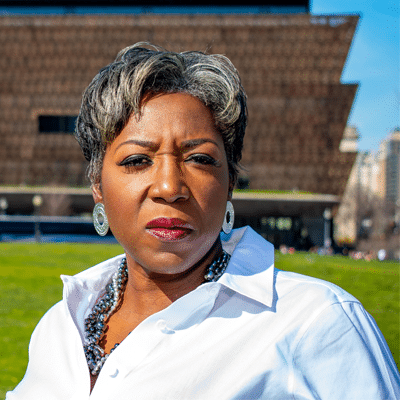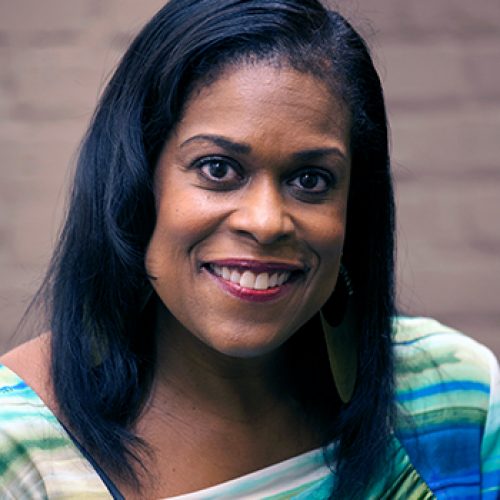Throughout Women’s History Month, we’ve celebrated and recognized the achievements and important milestones women have made. As it comes to a close, we wanted to highlight a woman that works to provide opportunities for women and overlooked communities. Meet Khadijah Tribble, Vice President of Corporate Social Responsibility (CSR) at Curaleaf. Head woman in charge for Rooted in Good. Cannabis freedom fighter. Extraordinaire.
How and why did you begin working in the cannabis industry?
Traditionally in college, you pick a major that really speaks to you, and run with it. But back in my undergraduate days, the idea that corporations were responsible for good business ethics and supporting the communities that they operate with and in, what we call CSR today, was not yet established.
After graduation, I was looking for work in the academia and nonprofit spaces. I really started paying attention to how drug policies were driving poverty in the communities that I lived and worked in. So when I had the chance to join the Board of Changing Perceptions, a D.C.-based nonprofit that creates entrepreneurial opportunities for formerly incarcerated individuals, I jumped at the opportunity.
I am still blown away by the thousands of collateral consequences related to marijuana arrests, convictions, and incarcerations. I often say the most dangerous gateway marijuana opened was the one to a lifetime of poverty and that’s not okay with me. It’s unnecessary and unacceptable. So here I am, but let’s be clear, I’m no Drug Policy Alliance. I am a Black, queer woman, using every opportunity in my position to help elevate my community and do what’s fair and right.
What is cannabis equity, and why is it important?
It’s a huge ethical issue to be a part of today’s booming, legal cannabis industry and not acknowledge the discriminatory effects of the War on Drugs. Black Americans make up nearly 30 percent of all drug-related arrests, the majority of those being marijuana, despite accounting for only 12.5 percent of all substance users. Hundreds of thousands of Black Americans and people of color have been convicted of a marijuana-related offense, many being as minor as one gram or less, with a consequence of decades or more in prison.
Now that marijuana is legal, it’s critical to create spaces for those disproportionately impacted by the War on Drugs to have an opportunity to participate in and capitalize in the legal, financially booming cannabis industry. As a Black queer woman, this is especially important to me. I want to make sure that my people, many of which are denied opportunities for being who they are, are provided equitable access to entrepreneurial, supply chain, plant, and non-plant touching opportunities within cannabis.
Under your leadership, how is Curaleaf’s Rooted in Good helping to increase equity and opportunities in cannabis for women through partnerships like Women Grow?
From our initiative to work with 420 diverse brands and product suppliers by 2025, to our internal culture and workforce efforts, to re-aligning our manufacturing practices to increase sustainability, Curaleaf is Rooted in Good (RIG). Most recently, and in celebration of Women’s History Month, Curaleaf’s CSR division, Rooted in Good announced a partnership with Women Grow which will focus on supplier diversity and education for women across the cannabis ecosystem. Through this partnership, we will connect with women, BIPOC, Veterans, and LGBTQ-owned business owners and build with these cannabis leaders across the 23 active legal states that we operate in.
 In addition to women, how does Rooted in Good provide equitable opportunities for other marginalized groups, including African Americans, People of Color, the LGBTQ community, etc.?
In addition to women, how does Rooted in Good provide equitable opportunities for other marginalized groups, including African Americans, People of Color, the LGBTQ community, etc.?
Curaleaf aims to create a diverse and vibrant cannabis industry, reflective of all people, everywhere. After all, cannabis is something that connects across age groups, ethnicities, cultures, and geographic locations. Through strategic partnerships, we will use our retail platform to elevate the brands of underrepresented ownership and origin. Our aim is to help amplify and empower diverse voices — building connections that will expand footprints far beyond the bounds of a single market.
Our industry-recognized Executive Roundtable provides mentorship, education, networking opportunities, and entrepreneurial support for individuals in areas disproportionately and traditionally impacted by the War on Drugs. Our vision is to provide the chance for a few committed individuals each year to immerse in a full-time, 1-year curated mentoring program.
Curaleaf takes our commitment to serve our communities beyond cannabis. As food insecurity affects every corner of the country, our Feed the Block initiative helps us feed our neighbors in need in communities where Curaleaf operates.
Curaleaf recently won the Minorities for Medical Marijuana’s Diversity & Inclusion Award and Cannabis Doing Good’s Good Neighbor Award for its work to advance diversity and inclusion in cannabis.
As a Black, queer woman, how does it resonate being in a position to pave pathways in cannabis that can sustain careers and change lives?
Outside of what’s owed to these communities, cannabis equity is definitely personal for me. Members of LGBTQ were some of the first public cannabis activists on the frontlines fighting for cannabis legalization. Many Black people and people of color had their lives shaken up and were thrown into prison or charged criminally because of marijuana. Now, the perspective on marijuana is changing. People are understanding its benefits and legalization is becoming more common and widespread.
With that, people are making a comfortable living off of cannabis and it’s important that those who help to build the industry are given a fair shot within it. Be it, entrepreneurship, supply chain, and retail ownership opportunities, or other business opportunities that help change the trajectory of their lives, for the better.
Khadijah Bio
Khadijah Tribble is a highly respected expert on equity and inclusion in the cannabis industry and has advised cannabis investors, government regulators, entrepreneurs, and businesses on policy, business development, and community impact. Before joining Curaleaf, Ms. Tribble founded Marijuana Matters (M2), a cannabis education and advocacy incubator, and is also the founder of the Marijuana Policy Trust (MPT), a think tank providing expertise toward building an inclusive and diverse cannabis industry. Prior to MPT, she was Chief Executive of Ground Game, LLC, a consultancy focused on health technologies, and was a co-founder and director of business operations for United Medical Center’s Rose Clinic. Ms. Tribble holds a master’s degree from Harvard University’s John F. Kennedy School of Government.

